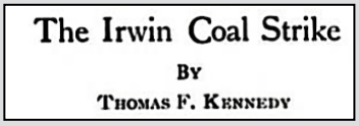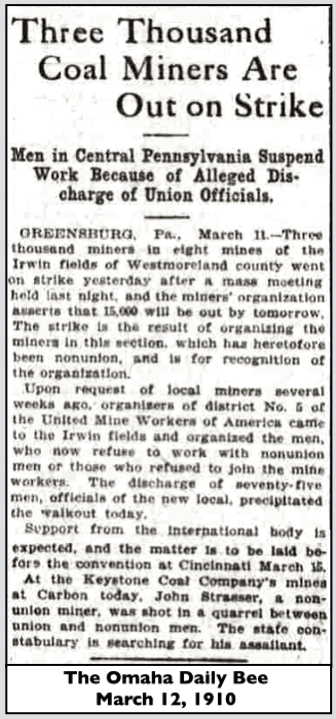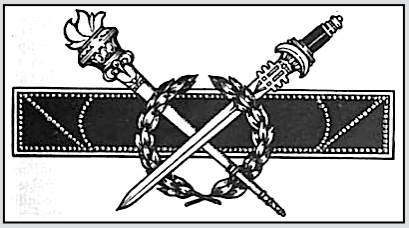 ———-
———-
Hellraisers Journal – Saturday August 27, 1910
“The Irwin Coal Strike” by Thomas F. Kennedy, Part III
From the International Socialist Review of August 1910:
[Part III of III]
At a Socialist meeting at Jamison No. I on the evening of July 8 three well known scabs walked up and took seats on the grass in the middle of the crowd. Several armed deputies were also present, and we heard later that a large body of these cut-throats were concealed nearby. The purpose of course was to irritate the strikers so they would attack the scabs and use this as an excuse for whole sale murder. They were disappointed because the scabs were not molested, except for the scourging usually given scabs and deputies by the speakers.
* * *
Not a single beer keg, beer case, beer bottle or whiskey bottle around any camp that I have visited. Not a sign of intoxication. This is one of the gratifying features of the strike.
* * *
Numerous dynamite explosions have occurred throughout the district during the strike. No one was injured and no damage to property resulted. If experienced miners accustomed to using explosives had been guilty of such folly there would be somebody or something destroyed. I have not the slightest doubt about declaring that this is the work of the operators or their agents, or of deputies who want their $5.00 day jobs to last and who perhaps are doing it without the knowledge of the sheriff or his employers, the operators.
One of the noteworthy features of the strike is the sympathy displayed by the farmers. And it is no mere lip sympathy either, but takes the good substantial form of defying the coal corporations and permitting the strikers to erect tents on their farms right under the noses of the scabs.
At Blackburn the company houses front on the public road. A farmer who owned the land on the other side of the road allowed the strikers to erect tents for those that had been evicted. So the tents of the strikers lined the road directly opposite the company houses occupied by the scabs. The superintendent approached the owner of the land and told him the tents were entirely too near the houses and that he should compel the strikers to move them back. The farmer replied promptly, “I thought of that too and was going to ask you to move the houses.” The tents were not and will not be moved.
Between 18,000 and 19,000 have quit working. Fully 10,000 of these have left and gone to other fields, some never to return. As soon as the Irwin men showed any disposition to fight, the organization of District 2 donated $2,000 and District 5, (Pittsburg) $8,000. For the last two months the National organization has been financing the strike. They were to have put in $20,000 a week, but they are hampered for cash by the strikes in Illinois and Kansas and have not been able to put in the full amount every week. A special assessment has been levied and the men who are out will be cared for so that no man can plead hunger as an excuse for returning to work.
Scabs came from all over the United States, but according to their own stories the great bulk of them are unskilled laborers hired in Chicago, New York and Philadelphia. One large vestibuled car was brought from New York loaded and taken down the New Alexander branch the most isolated part of the region. They were told that they were to work in a new mine and that they could make $6.00 a day with free board, and free beer and whiskey.
About forty of this load deserted in a few days and walked all the way to Irwin, eighteen miles. There were a few French and a number of Germans in this load. Some of them were Socialists and wore the party emblem . They declared that when they discovered how badly they had been deceived and what they were doing, they were ashamed to stop and talk to the strikers.
At a good many mines they have as many deputies as they have men working. The companies pay the deputies $3.50 a day and expenses. The scabs get free board and free beer and whiskey. So that the coal being mined now in the Irwin field is real black diamonds.
How it Started.
A miner from Greensburg came to the Miners’ headquarters in Pittsburg urging some organizers to come out, that he had a meeting arranged. As a forlorn hope the organizers went, and were agreeably surprised to find a big turn out and before they left they had organized a local.
The very next day about 100 men were discharged, 20 or so from each mine. The men had no notion of striking at that time, but immediately sent committees to demand the reinstatement of the discharged men. The operators refused to even see the committees. The men at Greensburg struck, and the strike spread to its present proportions.
The strike is being managed almost entirely by local men though the speakers and organizers are nearly all from outside districts. Many of the strikes of the Mine Workers have been hampered by bickerings and petty jealousies amongst the leaders. Some one wanted to shine and corral all of the glory. If there is any of this spirit present during this strike it is not apparent even to one who has a good opportunity to observe.
West Virginia Next.
When the operators of other districts were approached by their workers for concessions they always said, “Get after Irwin with whom we must compete.” They never dreamt that the miners would or could get after Irwin as they are now after it.
West Virginia is the other bugaboo that the operators always spring when the miners demand concessions. Now when Irwin can be stirred to strike, why can’t West Virginia? Nothing is impossible after the Irwin experience.
[Newsclip and emphasis added.]
~~~~~~~~~~~~~~~~~~~~~~
SOURCES
Quote Mother Jones, Last Great Battle, UMWC p420, Jan 26, 1910
https://play.google.com/books/reader?id=WyH1VOBn6BsC&printsec=frontcover&pg=GBS.PA420
The International Socialist Review, Volume 11
(Chicago, Illinois)
-July 1910 to June 1911
Charles H. Kerr & Company, 1911
https://www.marxists.org/history/usa/pubs/isr/
https://books.google.com/books?id=8-05AQAAMAAJ
ISR – Aug 1910
https://play.google.com/books/reader?id=8-05AQAAMAAJ&printsec=frontcover&pg=GBS.PA65
Irwin Coal Strike by Thomas F. Kennedy
https://play.google.com/books/reader?id=8-05AQAAMAAJ&printsec=frontcover&pg=GBS.PA99
Part II-Injunction
https://play.google.com/books/reader?id=8-05AQAAMAAJ&printsec=frontcover&pg=GBS.PA100
Part III-Socialist Meeting
https://play.google.com/books/reader?id=8-05AQAAMAAJ&printsec=frontcover&pg=GBS.PA102
IMAGE
Westmoreland Coal Strike Begins Mar 10,
-Omaha Daily Bee p15, Mar 12, 1910
https://chroniclingamerica.loc.gov/lccn/sn99021999/1910-03-12/ed-1/seq-15/
See also:
Hellraisers Journal: From International Socialist Review: “The Irwin Coal Strike” by Thomas F. Kennedy, Part I & Part II
~~~~~~~~~~~~~~~~~~~~~~~~~~~~~~~~~~~~~~~~~~~~~
There is Power in a Union – Billy Bragg



